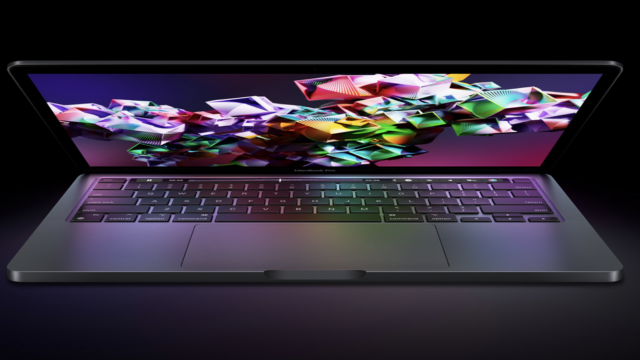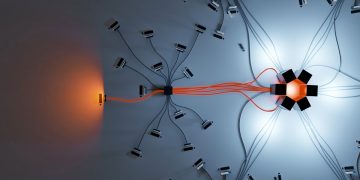This site may earn affiliate commissions from the links on this page. Terms of use.
Apple recently announced the follow-up SoC to its vaunted M1 chip; the cleverly-named M2. Though it will be rolling out soon in the revamped MacBook Air, the first computer that’s available with it is the 13″ MacBook Pro. That computer is already in testers’ hands, and so far tests have revealed an unfortunate performance regression. As it turns out, the “supercharged” (Apple’s phrasing) M2 device is hamstrung with a slow SSD when compared to the M1 model. At least, it is on the 256GB SSD base model.
As it turns out, Apple has changed the configuration of the SSDs on the new 13″ model. On the previous version it used two 128GB NAND ICs to achieve 256GB of storage. Not so on the new model, which uses a single 256GB IC. SSDs rely on parallelism to achieve increased performance, and without two chips the single-chip solution has less bandwidth to work with. This is why higher capacity drives are usually faster than smaller capacity drives. The single-chip drive is only capable of delivering exactly half the read speeds of its two-chip sibling. The write speeds are also significantly slower too.

The M2 model of the MacBook Pro has just a single SSD, with an empty pad next to it that was populated on the M1 model. (Image: MaxTech on YouTube)
YouTuber MaxTech ran the Black Magic Speed Test on both machines. In the write test, the M2 version hit 1,463 MB/s, while the M1 version scored 2,215 MB/s. That’s a 40 percent difference in write speed. In the read tests the difference was even more disparate. The M1 version achieved 2,900 MB/s, while the M2 version limped along at 1,446 MB/s. That’s a whopping 66 percent difference.
Unfortunately, this seems like a problem that can’t be fixed because of Apple’s stingy design. It also only affects the base model with a single 256GB SSD. A user on the Macrumors forum tested the more expensive 512GB version and it was just as fast as the M1 version. So it appears it’s definitely an issue of one NAND chip versus two. That means in order to get the best performance people will have to pony up an extra $200 for the 512GB version ($1,299 vs. $1,499).
This situation is especially egregious since the base model also only has 8GB of RAM. That’s usually fine for a lot of people because the SSD is so fast that it’s undetectable when data is being moved from the SSD to RAM and vice versa. At least, that was this author’s experience with an 8GB M1 MacBook Air. However, with these reduced read/write speeds, it could be an issue. All the various outlets examine this issue are waiting on a response from Apple about this situation. We’ll update this story if/when Apple responds.
Now Read:
Source by www.extremetech.com






























